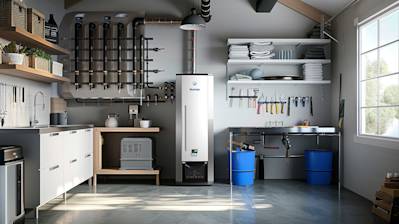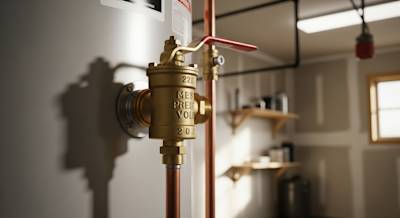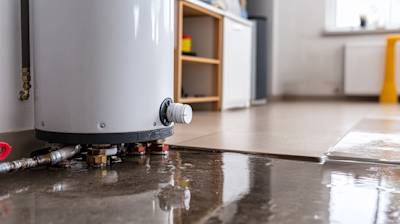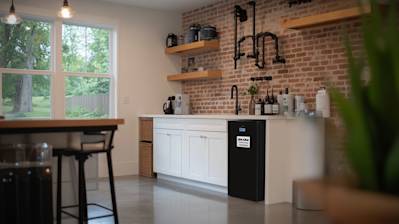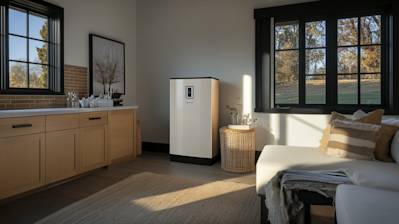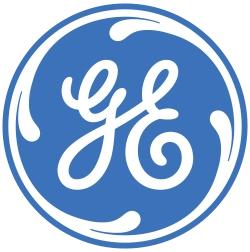Imagine easing into a warm, soothing shower after a day of work — the water temperature is just right, and there's no need to worry about running out of hot water. This modern convenience is brought to you by tankless water heaters. This innovative heating method revolutionises the way we heat water at home. With traditional water heaters being phased out in many homes, our comprehensive guide will delve into what tankless water heaters are, why they're increasingly popular, and important considerations before investing in one.
Understanding Tankless Water Heaters
Tankless water heaters, also called on-demand water heaters, heat water only when there's demand — a stark contrast to traditional storage tank water heaters that continuously heat and store hot water. Instead of storing hot water in a tank, these modern water heating devices use high-power burners to rapidly heat water as it runs through a heat exchanger. This results in an almost immediate and limitless supply of hot water.
Benefits of Using Tankless Water Heaters
The rise in popularity of tankless water heaters doesn’t stem from nowhere. They offer a plethora of benefits that make them an appealing replacement to traditional water heaters.
Energy Efficiency
Tankless water heaters are highly efficient as they only heat water when needed, reducing energy consumption and, therefore, utility bills. In fact, according to Energy.gov, homes that use 41 gallons or less of hot water daily can increase their water heating efficiency by 24-34% compared to using conventional storage tank heaters.
Space-Saving Design
Another appealing benefit is their compact size. Unlike traditional water heaters that occupy a significant amount of space, tankless heaters can be mounted on a wall, effectively saving floor space in your home.
Long Lifespan
Provided that they're maintained properly, tankless water heaters can last more than 20 years, often twice the lifespan of traditional storage tank heaters.
Unlimited Hot Water
Finally, a tankless water heater can provide an unlimited supply of hot water – perfect for showers, laundry, and other domestic chores. No need to worry about hot water running out in the middle of a shower.
Important Considerations Before Going Tankless
Before switching to tankless water heaters, there are several important considerations.
- Installation costs: The initial installation cost of a tankless water heater can be quite high as it may require home adjustments like rewiring or gas line resizing.
- Hot water demand: It's crucial to accurately estimate your home's hot water demand to choose the correct size for your tankless water heater.
- Maintenance: Regular maintenance is necessary. For example, hard water can leave mineral deposits in your tankless water heater over time, impacting its efficiency and lifespan.
Types of Tankless Water Heaters
There are primarily two types of tankless water heaters: electric and gas-powered.
Electric Tankless Water Heaters
Electric tankless water heaters are generally smaller and more energy-efficient than their gas counterparts. They're ideal for homes with lower hot water demand and efficiencies can reach up to 99%.
Gas-powered Tankless Water Heaters
Gas-powered tankless water heaters, on the other hand, can heat water faster and are more suited to larger homes. However, they typically have efficiencies in the range of 80-85%.
The decision to invest in a tankless water heater depends on your household’s hot water demands, budget, and sustainability goals. But one thing is sure: opting for a tankless water heater means enjoying a continuous and efficient supply of hot water every day.
Frequently Asked Questions About Tankless Water Heaters
How do tankless water heaters function?
In a tankless water heater, the water is heated directly without the use of a storage tank. When a hot water tap is turned on, cold water flows through a pipe into the unit, and either a gas burner or an electric element heats the water. As a result, tankless water heaters deliver a constant supply of hot water.
What makes tankless water heaters unique?
Unlike traditional water heaters that heat a limited amount of water in a large tank, tankless water heaters heat water as you need it. This means they operate more efficiently, as they do not need to continually heat a large volume of stored water.
Are there different types of tankless water heaters?
Yes, there are two main types of tankless water heaters: gas-fired and electric. Gas-fired units use a burner to heat water, while electric units use an electric heating element. Both types operate on the same principle, but they differ in their energy source.
What is the lifespan of a tankless water heater?
Most tankless water heaters have a life expectancy of more than 20 years. They also have easily replaceable parts that extend their life by many more years. In contrast, storage water heaters last 10–15 years.
How energy efficient are tankless water heaters?
Tankless water heaters are usually more energy-efficient than traditional water heaters. This is because they heat the water directly, without the need to store a large volume of hot water. Thus, they avoid the energy losses associated with storage water heaters.
Can a tankless water heater support multiple appliances at once?
Yes, a tankless water heater can support multiple appliances simultaneously. However, the number of appliances that can be used at the same time depends on the flow rate of the heater.
What kind of maintenance do tankless water heaters need?
Tankless water heaters should be serviced once a year by a professional. The service includes cleaning the heating elements, checking the exhaust vent, and descaling the heat exchanger. Regular maintenance can prolong the lifespan of a tankless water heater and ensure it runs efficiently.
Do tankless water heaters provide instant hot water?
Although tankless water heaters are often advertised as "instant" hot water providers, there is usually a slight delay from when you turn on the faucet to when the hot water reaches the outlet. The delay is due to the time it takes for the water to heat up and travel through the pipes to the faucet.
Can I install a tankless water heater by myself?
Installing a tankless water heater can be complex and typically requires a professional. It involves handling gas, electricity, and water lines. Depending on where you want to place the unit, you may also need to install new venting options. Therefore, it's recommended to hire a professional for this job.
What should I consider when buying a tankless water heater?
Consider the size, fuel type, availability, cost, energy efficiency, and installation and maintenance requirements. Make sure to choose a model that fits the hot water demand of your household. Also, the availability and cost of the energy source—whether it's gas or electricity—in your area should be considered.
Pros & Cons of Tankless Water Heaters
Pros of Tankless Water Heaters
Energy Efficiency
Tankless water heaters, also known as demand-type or instantaneous water heaters, provide hot water only as required, leading to significant energy efficiency. According to the U.S. Department of Energy, they can be anywhere from 8% to 34% more energy efficient than traditional tank water heaters, depending on a household's daily demand for hot water.
Lower Operating Costs
As a result of their high energy efficiency, tankless water heaters generally have lower operating costs than traditional tank water heaters. Over time, these energy savings can make a significant difference in utilities bills and offset the higher upfront cost of tankless units.
Long Lifespan
Another significant advantage to tankless water heaters is their extended lifespan. These units typically last over 20 years, in contrast to traditional tank water heaters which have an average lifespan of 10-15 years. This longevity could potentially justify the initial expense for some households.
Unlimited Hot Water
Unlike traditional water heaters, which can run out of hot water during extensive use, tankless water heaters guarantee an endless supply of hot water, as they heat the water on-demand.
Space Saving
Tankless water heaters occupy less space than traditional water heaters, as they do not have a bulky storage tank. They can often fit even the most limited spaces-making them an ideal choice for smaller homes or apartments.
Cons of Tankless Water Heaters
Higher Upfront Costs
The most significant disadvantage of tankless water heaters is their high initial cost. They can cost up to three times as much as traditional tank water heaters, making them a considerable investment.
Complex Installation Process
Installation of a tankless water heater is more complex than a typical hot water tank installation. It often requires significant changes to your home's plumbing and electrical systems, which can add to the installation cost significantly.
Possible Inadequate Heating Capacity
In larger homes or households with high hot water demand, a single tankless unit might not be sufficient. In such cases, one may need to install multiple units, which can increase the expenses further.
Inconsistent Water Temperature
There can be inconsistent water temperatures if hot water is demanded from multiple outlets at the same time. This is known as a "cold water sandwich" and can be an inconvenience.
Sensitive to Water Quality
Tankless water heaters can be sensitive to the quality of the water supply. Hard water can lead to scale buildup in the heat exchanger, which can affect the heater's performance and even decrease its lifespan.
Summary
Tankless Water Heaters are a space-saving, cost-effective solution for your hot water needs. Although they might require a little more upfront investment, they provide long-term savings by using energy more efficiently. So, if you're working toward a more sustainable lifestyle or simply want to lower your monthly bills, tankless options are worth considering.
Moreover, a lot of convenience comes with these modern heaters. Imagine never having to worry about running out of hot water in the middle of a relaxing shower! That's a typical benefit of Tankless Water Heaters as they can provide a continuous supply of hot water. They also offer extended longevity, with lifespans of over 20 years compared to traditional tank models that need to be replaced approximately every 10 years.
Nonetheless, it's important to assess household requirements before making a decision. While Tankless Water Heaters perform amazingly in smaller households, they sometimes fall short in larger, multi-bathroom homes where hot water is required simultaneously at different points. Keep in mind the energy source compatibility too, as these heaters come in both gas and electric models. In the end, choosing a water heater is all about balancing your hot water needs, energy-saving preferences, and budget.
About KYPD Plumbing
Welcome to KYPD Plumbing, headquartered in homey Nicholasville, KY! We have been committed to providing top-notch plumbing solutions since our establishment. Our team of highly skilled professionals is all geared up to tackle any plumbing challenges, whether it's a minor leakage or a major overhaul. Our dedication to superior customer service has helped us gain trust and reputation in the community. You're invited to learn more about us and our journey so far in the plumbing business here. We are looking forward to serving you soon!
Tags: Tankless Water Heaters, Energy Efficiency, Home Improvement,



